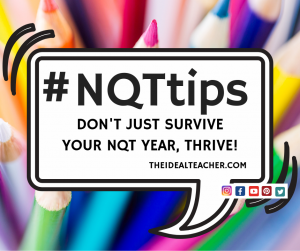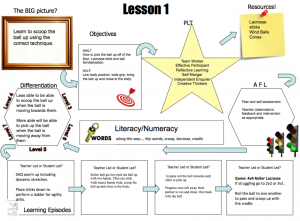 What I Wish I Had Known When I Started My NQT Year
What I Wish I Had Known When I Started My NQT Year
From 2016-2017, I was an NQT (Newly Qualified Teacher). After seeing the hashtag #nqttips on Twitter recently and with it being the start of a new academic year, I wanted to put together some NQT tips that could be used by NQT’s but might also serve as a useful refresher to all teachers in the new academic year.
Many of these NQT tips are bits of advice that I wish I had been given when I began my NQT year in 2016 and which I feel would have made my year go even better.
I undertook my NQT year position at two different schools due to circumstances beyond my control. The two schools included a comprehensive school near the coast in Norfolk and a grammar school in Lincolnshire. Obviously, both types of schools are inherently different due to the selection process. However, apart from that, there were many similarities between the two: behaviour, teaching and learning, homework, parents’ evenings, meetings etc.
I hope that my NQT tips below will help you to enjoy the year more and flourish in your school. I have starred the tips that I was given at the start of my journey and wish I had taken a bit more notice of them! Being an NQT can be quite daunting, but don’t forget, you have passed your QTS or PGCE, so you are ready for this journey!
25 NQT TIPS TO THRIVE IN YOUR FIRST FULL YEAR OF TEACHING
 Be Yourself
Be Yourself
1) You are going to be in the classroom for so many lessons every week so, be yourself. Forget what type of teacher ‘Mrs Hall’ is or why the students like ‘Mr Wheeler’. Be the teacher you want to be. Take some time to let the students know a little about you and give them the chance to share things about themselves with you. Spending 5-6 hours per day in front of different classes trying to be someone else will be extremely exhausting.
It’s Your Classroom, You Are In Charge
 2) Use a seating plan from day 1 – this will give you flexibility during the year to move students around without too much hassle and will also allow you to strategically place students for differentiation and behaviour management.
2) Use a seating plan from day 1 – this will give you flexibility during the year to move students around without too much hassle and will also allow you to strategically place students for differentiation and behaviour management.  3) Other teachers might have more experience when it comes to behaviour management than you do, but this is your journey! Remember that they were an NQT once too. Set the boundaries in the first lesson and refer back to them regularly. Keep a copy of the school’s behaviour policy in your classroom for reference purposes and follow it when necessary. One other useful tip when it comes to managing behaviour, is using the school’s policy combined with behaviour management strategies. Otherwise, you will be handing out SIMS entries and detentions left, right and centre. Check out the Language-of-Correction-Skills-Staircase.jpg (1167 downloads ) which my mentor gave me, which could also be useful for behaviour management in your NQT year too.
3) Other teachers might have more experience when it comes to behaviour management than you do, but this is your journey! Remember that they were an NQT once too. Set the boundaries in the first lesson and refer back to them regularly. Keep a copy of the school’s behaviour policy in your classroom for reference purposes and follow it when necessary. One other useful tip when it comes to managing behaviour, is using the school’s policy combined with behaviour management strategies. Otherwise, you will be handing out SIMS entries and detentions left, right and centre. Check out the Language-of-Correction-Skills-Staircase.jpg (1167 downloads ) which my mentor gave me, which could also be useful for behaviour management in your NQT year too. 4) Don’t be afraid of wasting time in your classroom to develop routines and establish your authority early on in the year, especially if it will make your life easier later on. This could include enforcing a strong work ethic, implementing and establishing classroom ‘rules’ and good behaviour for learning, for example. Remember that each teacher probably has a slightly different tolerance for behaviour for learning, work ethic and noise levels, so remind your students regularly of your expectations. If they aren’t doing what you are telling them, keep saying it until they do.
4) Don’t be afraid of wasting time in your classroom to develop routines and establish your authority early on in the year, especially if it will make your life easier later on. This could include enforcing a strong work ethic, implementing and establishing classroom ‘rules’ and good behaviour for learning, for example. Remember that each teacher probably has a slightly different tolerance for behaviour for learning, work ethic and noise levels, so remind your students regularly of your expectations. If they aren’t doing what you are telling them, keep saying it until they do. 5) Follow up! If you say your are going to do something, do it. This could be as simple as putting homework on Google Classroom, or telling a student you will go through something with them at lunch time. If you set a detention or a work catch up session, make sure you are there to enforce it. If you don’t, students may not take you seriously and this will definitely cause you grief later down the line. It might take a lot of effort, but I assure you, it’s worth the time.
5) Follow up! If you say your are going to do something, do it. This could be as simple as putting homework on Google Classroom, or telling a student you will go through something with them at lunch time. If you set a detention or a work catch up session, make sure you are there to enforce it. If you don’t, students may not take you seriously and this will definitely cause you grief later down the line. It might take a lot of effort, but I assure you, it’s worth the time.
6) Misbehaviour will occur – there is no such thing as a bad kid, sometimes children just make bad decisions and there is always a reason for it – invest time in finding out what the issue is and try to work on resolving it with the student, with the support of your mentor. If this is something that is out of your control though, begin each lesson with a clean slate. 7) Choose 3-4 reliable students per class who are willing to let students who have been absent borrow their books (in school time) to catch up with work they have missed. Ensure you double check the work has been completed within a reasonable time-frame.
7) Choose 3-4 reliable students per class who are willing to let students who have been absent borrow their books (in school time) to catch up with work they have missed. Ensure you double check the work has been completed within a reasonable time-frame.8) Make sure work-shy students catch up at breaks/lunch times – don’t let them get away with poor work ethic, it won’t help them or you.
9) Reward good behaviour and good work with meaningful praise, stickers, first out of the room for lunch and other ‘treats’ that you can decide individually or with your class.
You Are Not Alone
 10) Ask Questions – if you don’t know, ask. Your NQT year gives you this freedom (you can also do this after your NQT year too, but anyway…) Other teachers want to help you and will be more than happy to answer questions to avoid seeing your struggle. Speak to your mentor or training coordinator with subject related or general questions. Don’t sit (or stand) in silence!
10) Ask Questions – if you don’t know, ask. Your NQT year gives you this freedom (you can also do this after your NQT year too, but anyway…) Other teachers want to help you and will be more than happy to answer questions to avoid seeing your struggle. Speak to your mentor or training coordinator with subject related or general questions. Don’t sit (or stand) in silence!11) Share ideas and resources – your colleagues have probably got loads of ideas and resources and often these are on a shared drive so take the opportunity to use them. Reciprocate this by sharing your new ideas and saving your resources on the shared teacher drive as well.
12) Share concerns – if you are concerned about a student or a group, share this with your subject mentor or your training coordinator – that’s what they are there for. 99% of the time, they will be able to offer you a solution.
Planning, Planning and More Planning?
 13) Study your class lists before the start of term and read the information on any SEN students. This information will tell you specific issues students are dealing with, as well as how, as a teacher, you in turn must deal with them during lessons. For example, I didn’t know a student needed to be sat at the front due to eye problems and had him at the back for 3-months. Another student had anger management issues and stormed out of the classroom – I got so flustered and didn’t know how to handle the situation. If I had read his notes, I would have known that he has a ‘cool off’ period and would come back after five minutes.
13) Study your class lists before the start of term and read the information on any SEN students. This information will tell you specific issues students are dealing with, as well as how, as a teacher, you in turn must deal with them during lessons. For example, I didn’t know a student needed to be sat at the front due to eye problems and had him at the back for 3-months. Another student had anger management issues and stormed out of the classroom – I got so flustered and didn’t know how to handle the situation. If I had read his notes, I would have known that he has a ‘cool off’ period and would come back after five minutes.
We are here for the learners, so make sure you read this very useful information and if you can’t find it, ask the SEN department.14) Before you start the course, print out and read the Schemes of Work (SOW) per year group – annotate them and put them into plastic wallets, separated by term. This will ensure you cover all the material you need to cover and the students are prepared for any tests or assessments during the year. Refer to these regularly whilst lesson planning. I kept these with seating plans in a folder by year group, which is also handy for cover lessons to ensure your students don’t just sit where they want and cause havoc for cover teachers!
 15) When it comes to lesson planning, avoid re-inventing the wheel. Use the materials other teachers have created, browse the resources on TES, Facebook groups or Pinterest. I love the ‘5 minute lesson plan’ by The Teacher Toolkit which allows you to think about all the main points of your lesson in 5 minutes or so. This is a brilliant NQT tip that I received before I started my journey. There are lots of other pressures on you, such as form groups, parents, targets, meetings etc, spend your time reflecting on lessons and progress in the classroom, rather than using the time to plan all singing and dancing lessons, which could be limited on learning.
15) When it comes to lesson planning, avoid re-inventing the wheel. Use the materials other teachers have created, browse the resources on TES, Facebook groups or Pinterest. I love the ‘5 minute lesson plan’ by The Teacher Toolkit which allows you to think about all the main points of your lesson in 5 minutes or so. This is a brilliant NQT tip that I received before I started my journey. There are lots of other pressures on you, such as form groups, parents, targets, meetings etc, spend your time reflecting on lessons and progress in the classroom, rather than using the time to plan all singing and dancing lessons, which could be limited on learning.
16) Save resources logically, it will make life after your NQT year MUCH easier.
17) Have a bank of no-prep activities ready for when your class isn’t playing ball or your prepared activity isn’t working. There are loads of no-prep activities for language lessons here.
 18) Be reflective after every lesson, even if it’s internally. Have a conversation with yourself, or your mentor to consider your WWWs (What Went Well) and EBIs (Even Better Ifs)!
18) Be reflective after every lesson, even if it’s internally. Have a conversation with yourself, or your mentor to consider your WWWs (What Went Well) and EBIs (Even Better Ifs)!- Time Management
19) Avoid being a perfectionist – There aren’t enough hours in the day to plan, mark, teach, attend meetings, input data, monitor progress, reflect, respond to emails …and be a perfectionist – trust me. The students don’t care if your wording is too much to the left! Just ensure you use a font that is 22 or larger and strong colours that the students can easily see and read. I was asked to avoid oranges, yellows and greens.
 20) Check your emails a maximum of three times per day – Before school, mid-day and after-school. If you check more frequently, it will distract you from doing other jobs.
20) Check your emails a maximum of three times per day – Before school, mid-day and after-school. If you check more frequently, it will distract you from doing other jobs. - Continuous Professional Development (CPD)
 21) Observe as many teachers as you can – you have an extra hour in your timetable for CPD, so use it. I learned so much from watching other teachers do their thing. I got ideas for behaviour management, for classroom management, as well as teaching techniques. This is something you can do too.
21) Observe as many teachers as you can – you have an extra hour in your timetable for CPD, so use it. I learned so much from watching other teachers do their thing. I got ideas for behaviour management, for classroom management, as well as teaching techniques. This is something you can do too.
 22) Social media is 100% a game changer for CPD. It can be time consuming initially, but once you are following the right people, you will save time on your planning! This is my favourite NQT tip!
22) Social media is 100% a game changer for CPD. It can be time consuming initially, but once you are following the right people, you will save time on your planning! This is my favourite NQT tip!
Twitter – follow Twitter hashtags related to your subject, as well as other teachers who teach your subject on the platform.
Instagram – follow other teachers who teach your subject from around the world to get inspiration
Pinterest – there are SO many resources out there for you to use, spend a little time following other teachers and creating boards related to different themes in your subject to go back to and make your life easier in the future
Facebook – join Facebook groups specifically related to your level of teaching, as well as your subject to share ideas and gain more knowledge.
 23) Training courses – Ask to go on courses related to your targets. If you are struggling with behaviour or need a bit more clarity on how to teach the A Level course in your subject, ask for training. If the school invests in you, it’s the students who will benefit. At the end of the day, it’s the students we go to school for and they deserve the best.
23) Training courses – Ask to go on courses related to your targets. If you are struggling with behaviour or need a bit more clarity on how to teach the A Level course in your subject, ask for training. If the school invests in you, it’s the students who will benefit. At the end of the day, it’s the students we go to school for and they deserve the best. Remain Positive
 24) Stay passionate and positive. You will definitely have days when you feel like it’s all a bit too much. When you get those days, talk to your colleagues, family and/or friends to get some perspective. Then, get ready for school as you normally would the next day, prepared for a great day ahead.
24) Stay passionate and positive. You will definitely have days when you feel like it’s all a bit too much. When you get those days, talk to your colleagues, family and/or friends to get some perspective. Then, get ready for school as you normally would the next day, prepared for a great day ahead.25) Smile – it makes a huge difference in the classroom, around school and at home. Hopefully you are a teacher because you love your subject and/or you love to teach. Smile about it – you have a brilliant job!
This isn’t necessarily an NQT tip, but something that I found online recently and have adapted for you. Why not keep a note of how each day has gone during your NQT year with the ‘ My Year In Pixels (1049 downloads ) ‘ calendar? All you have to do is print it out, choose six colours and fill the little boxes in on the sheet. See how your day goes and colour it in. The aim of the calendar (which you can stick into your planner) is to show that you will have more good days than bad days in teaching, even if it doesn’t feel like it! #nqttips
——
 Did you find this content useful? You can follow me on my socials below or search @TheIdealTeacher on Instagram, Pinterest, Facebook, YouTube and Twitter.
Did you find this content useful? You can follow me on my socials below or search @TheIdealTeacher on Instagram, Pinterest, Facebook, YouTube and Twitter.
—–
Remember to Sign Up to TheIdealTeacher’s Mailing List to stay up-to-date with my latest content!
JOIN ME ON MY SOCIALS FOR MORE FAB TEACHING CONTENT >>








